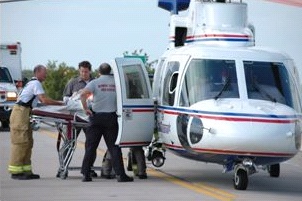Emergency Helo to Miami: $66,000 or… free…
by Arnaud and Naja Girard…….
“First I said I didn’t want to take the helo,” says Ellen Engleson, who had arrived at Lower Keys Medical Center with a broken femur, “I was concerned about the cost.” She was right. After being heliported to Jackson Memorial Hospital in Miami, Ellen received a bill for $ 59,000 from LifeNet, a for-profit medical emergency helicopter service.
She has since learned that the hospital in Key West could have made the choice to send her for free, in the County’s Trauma Star medical transport helicopter.
The controversy over the medical helicopter fare has been brewing for years. Trauma Star is funded by the County through property taxes and is part of the overall law enforcement and judicial budget. The fare is charged to the patient’s insurance if they have one at a cost of about $15,500 from Lower Keys Medical Center to Jackson Memorial. Any portion that is not reimbursed by the insurer is waived by the County. LifeNet’s helo service, on the other hand, is currently charging around $ 66,000 for the same trip.

We asked Fire Chief Jim Callahan, who directs the Trauma Star Air Ambulance service, how the decision is made on whether to call Trauma Star or LifeNet. “When someone is seriously injured on the roadway and they need to get flown to Jackson Memorial,” says Callahan, “Trauma Star is used if available. When the decision takes place at the hospital then it’s 100% up to the doctors.”
Callahan told The Blue Paper that over the years the county government has had meetings with hospital administrators to try to influence the way the decision is made. “We’ve had zero results,” says Callahan, “The hospital states they have no special commercial relationship with LifeNet and there’s no reason to believe otherwise. It appears to be a matter of convenience. The LifeNet helicopter is stationed at the hospital. It’s right there on the helicopter pad. The Trauma Star helicopter flies out of Marathon. When the situation is life-threatening, and every second counts, it always makes sense to use the quickest method.”
“The doctor – I think he was a doctor or a nurse – told me that a road trip by ambulance would be very painful,” says Engleson, “My leg was completely broken. But I don’t understand why they didn’t tell me there was a free helicopter. I find it very fishy. My situation was not life-threatening. I could have waited for the County helicopter.” Ellen’s insurance doesn’t cover any part of the $ 59,000 air transport bill.
We were unable to reach anyone at the Lower Keys Medical Center this week who was willing to speak to us about the issue.
Trauma Star costs County taxpayers about $2.5 million a year. That includes maintaining the helicopter and equipment, as well as the cost of fuel, pilots, nurses, and paramedics.
“We are typically able to reimburse about $1.5 million of that,” says Callahan. We now get about 300 calls a year. I want to say that we are not in competition with Life Net. The County absolutely needs both services. If there is more than one emergency, for example, which happens, we absolutely need two helicopters.”

It’s important for residents to be aware of the Trauma Star option and to make hospital staff aware of their desire to take advantage of the free service being provided by the County. Monroe County Commissioner Rice has a practical proposal: The creation of “Trauma Start First Option” stickers that would be dispersed to Monroe County residents. The stickers could be applied to health insurance cards.
In the summary introducing the resolution to fellow Commissioners, Rice observes that:
First Responders & medical staff at the hospital will always look for identification and a health insurance card when in a patient’s personal effects when they are brought into an emergency facility, and will make a copy front and back of the health insurance card and ID for the billing office. A “Trauma Star First Option” sticker on the insurance card will bring medical staff’s attention to the patient’s personal choice prior to transport being called.
Commissioner Rice is hoping to facilitate what’s best for residents, “Both Trauma Star and LifeNet provide essential services in times of crisis. However I feel that it is important that our taxpayers are informed of their rights regarding transport by Trauma Star and that their choice is effectively communicated to the Hospital during a time of great stress.”
DID YOU LIKE THIS STORY? SUPPORT THE BLUE PAPER
Help us continue to bring you local investigative journalism… Click on the image to make a donation [NOT tax deductible].




